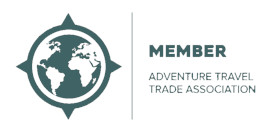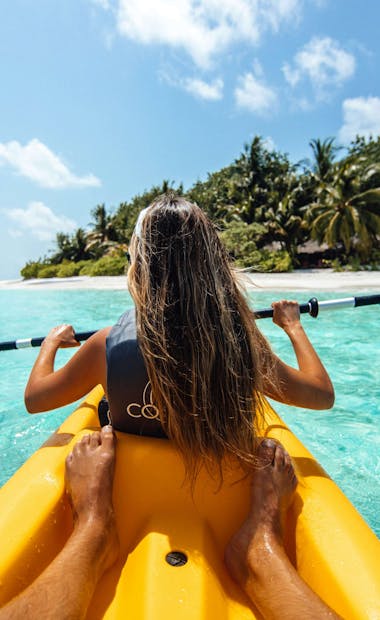France Tours
Explore France With A Small Group Guided Tour
Popular tours
- Save21%
 View Tour
View TourCycle the Loire Valley - 7 Days
- Blois to Angers
- Age group: 14 - 99
- Max group size: 15
Was:£1,670From£1,323 - Save21%
 View Tour
View TourJourneys: Paris & Normandy Highlights - 8 Days
- Paris to Paris
- Age group: 12 - 100
- Max group size: 16
Was:£2,599From£2,058 - Save15%
 View Tour
View TourFrance Family Journey: From Paris to Normandy and Beyond - 9 Days
- Paris to Paris
- Age group: 7 - 100
- Max group size: 20
Was:£3,439From£2,923 - Save16%
 View Tour
View TourLocal Living France: Toulouse - 7 Days
- Toulouse to Toulouse
- Age group: 12 - 100
- Max group size: 14
Was:£1,329From£1,118 - Save1%
 View Tour
View TourCycle Provence - 8 Days
- Avignon to Arles
- Age group: 14 - 99
- Max group size: 15
Was:£1,975From£1,955 - Save1%
 View Tour
View TourHighlights of Mont Blanc - 8 Days
- Les Houches to Les Houches
- Age group: 16 - 79
- Max group size: 16
Was:£1,900From£1,881
France Tours
Welcome to France, a land of unparalleled beauty, timeless elegance, and exquisite gastronomy! Embark on an unforgettable journey with our exclusive France tours and experience the essence of this captivating country. From the romantic streets of Paris to the sun-kissed vineyards of Bordeaux, France is a dream destination that beckons travelers from around the globe.
Indulge your senses in the City of Love, Paris, where you'll be enchanted by iconic landmarks such as the Eiffel Tower, Louvre Museum, and Notre-Dame Cathedral. Stroll along the elegant boulevards, sip a café au lait at a charming sidewalk café, and witness the artistic mastery of the world-famous Montmartre district. The Louvre, with its mesmerizing art collection including the enigmatic Mona Lisa, will transport you to a world of creativity and inspiration.
Beyond the capital, France boasts a diverse tapestry of landscapes. In the picturesque French Riviera, you'll find the glamorous resort towns of Cannes and Nice, where sun-drenched beaches and azure waters beckon. Explore the charming villages of Provence, dotted with lavender fields and vineyards, and savor the vibrant flavors of the region's cuisine. Indulge in the aromatic wines of Bordeaux and traverse the enchanting vineyards that produce some of the world's finest vintages.
History comes alive in the magnificent Loire Valley, with its fairytale-like castles and grand palaces, such as Château de Chambord and Château de Chenonceau. Marvel at the architectural wonders of Gothic masterpieces like the Notre-Dame de Chartres Cathedral and the majestic Mont Saint-Michel rising from the sea.
For nature lovers, the French Alps offer breathtaking landscapes of snow-capped peaks, pristine lakes, and picturesque alpine villages. Experience the thrill of outdoor adventures, from skiing and snowboarding in winter to hiking and mountaineering in the summer months.
And let's not forget the gastronomic delights that await you in France. Savor the delicate pastries of Paris, indulge in the world-class cuisine of Lyon, and delight in the aromatic cheeses and wines that grace every region of this culinary paradise.
France is a treasure trove of art, culture, history, and natural beauty, inviting you to immerse yourself in its unparalleled charm. With our expertly crafted France tours, you'll discover the country's hidden gems and iconic landmarks, guided by our knowledgeable local experts.
Whether you're seeking a romantic getaway, a gourmet adventure, or a cultural exploration, France promises an extraordinary experience that will leave an indelible mark on your heart. Join us on a remarkable journey through this timeless destination and create memories to last a lifetime. Book your France holidays with us today and let the magic of France embrace you in its embrace.
When is the best time to visit France?
The best time to visit France largely depends on your preferences and the regions you plan to explore. France offers diverse climates and a range of activities throughout the year. Here's an overview of the different seasons and what they offer:
Spring (April to June): Spring is a delightful time to visit France, with milder temperatures, blooming flowers, and fewer crowds. It's an ideal time to explore cities like Paris, Provence, and the French Riviera. The countryside is lush and vibrant, and outdoor activities become more enjoyable.
Summer (June to August): Summer is the peak tourist season in France, particularly in popular destinations like Paris, the French Riviera, and the Loire Valley. Expect warm weather, longer daylight hours, and a buzzing atmosphere. It's an excellent time for beach activities, outdoor festivals, and exploring the charming coastal towns.
Autumn (September to October): Autumn brings mild temperatures and fewer crowds, making it a great time to visit France. The vineyards in regions like Bordeaux and Burgundy are particularly picturesque during the harvest season. It's also a perfect time for exploring cities, enjoying cultural events, and indulging in the local cuisine.
Winter (December to February): Winter in France offers a magical ambiance, especially during the holiday season. Paris shines with festive decorations, and ski resorts in the French Alps come alive with winter sports enthusiasts. Christmas markets, warm drinks, and cozy atmosphere add charm to the cities. However, note that some attractions and restaurants may have reduced hours during this period.
It's worth noting that specific regions in France have unique climates and seasonal variations. Coastal areas like the French Riviera enjoy milder winters, while mountainous regions experience colder temperatures and snowfall.
Consider your preferred activities, climate preferences, and the level of crowds you're comfortable with when choosing the best time to visit France. Keep in mind that popular tourist destinations tend to be busier during peak seasons. Regardless of the time you choose, France offers an array of experiences and delights throughout the year.
Will I need a visa to travel to France?
Whether or not you need a visa to travel to France depends on your nationality and the purpose and duration of your visit. France is part of the Schengen Area, which allows for visa-free travel among its member countries for certain nationalities. Here are some general guidelines:
Visa-Free Travel: Citizens of the European Union (EU) and the European Free Trade Association (EFTA) countries (such as Switzerland, Norway, Iceland, and Liechtenstein) do not need a visa to enter France. Additionally, citizens of many other countries, including the United States, Canada, Australia, and Japan, can enter France and stay for up to 90 days within a 180-day period without a visa.
Schengen Visa: If you are a citizen of a country that does not have a visa exemption agreement with the Schengen Area, you will need to apply for a Schengen visa. This visa allows you to travel within the Schengen Zone, including France, for up to 90 days within a 180-day period. You will need to submit an application at the French embassy or consulate in your home country or the designated visa application center.
Long-Term Visas: If you plan to stay in France for more than 90 days or have a specific purpose for your visit, such as work, study, or family reunification, you will need to apply for a long-term visa or a residence permit. These visas have specific requirements and may involve additional documentation and procedures.
It's important to note that visa regulations can vary depending on your nationality, so it's advisable to check with the French embassy or consulate in your home country or consult an official visa service for the most up-to-date and accurate information regarding visa requirements.
Remember to apply for your visa well in advance of your intended travel dates to allow for processing time. It's recommended to review the specific requirements and gather all necessary documents to ensure a smooth visa application process.
What are the must see destinations in France?
France is a country brimming with captivating destinations, each offering its own unique charm and allure. Here are some must-see destinations in France that showcase the country's rich history, stunning landscapes, and cultural treasures:Paris: The "City of Love" needs no introduction. Paris is a world-renowned destination, home to iconic landmarks like the Eiffel Tower, Louvre Museum, Notre-Dame Cathedral, and Champs-Élysées. Explore the charming neighborhoods of Montmartre and Le Marais, indulge in exquisite cuisine, and immerse yourself in the city's art, culture, and romance.
French Riviera: This glamorous stretch of coastline on the Mediterranean is synonymous with luxury and beauty. Visit the chic city of Cannes, famous for its film festival, relax on the pristine beaches of Nice, and experience the vibrant nightlife of Saint-Tropez. Don't miss the charming village of Eze and the picturesque town of Antibes.
Provence: Known for its lavender fields, vineyards, and charming villages, Provence is a dreamlike destination. Explore the vibrant markets of Aix-en-Provence, wander through the historic streets of Avignon, and visit the breathtaking Gorges du Verdon. The region also offers delectable cuisine and renowned wines.
Loire Valley: Step into a fairytale as you visit the magnificent châteaux of the Loire Valley. Discover the grandeur of Château de Chambord, marvel at the elegance of Château de Chenonceau, and explore the historical gems of Amboise and Blois. The region's lush landscapes and picturesque towns add to its enchanting appeal.
Bordeaux: Wine lovers will be delighted by Bordeaux, a region renowned for its vineyards and prestigious wines. Take a wine tour, visit elegant wine estates, and sample world-class vintages. The city itself is a UNESCO World Heritage site, featuring beautiful architecture and a vibrant culinary scene.
Normandy: Known for its historical significance, Normandy offers a mix of stunning coastline, charming towns, and poignant World War II sites. Visit the beautiful medieval city of Rouen, explore the iconic Mont Saint-Michel, and pay tribute to the D-Day landing beaches.
French Alps: For outdoor enthusiasts, the French Alps provide a playground for adventure. Ski in world-class resorts like Chamonix and Courchevel, hike through breathtaking mountain trails, and enjoy the alpine scenery year-round.
These are just a few highlights, and there is much more to explore in France, including the enchanting villages of Alsace, the picturesque island of Corsica, the historic city of Lyon, and the beautiful landscapes of the Dordogne region. Each destination offers its own unique experiences and delights, ensuring that France caters to a wide range of interests and preferences.
What is the local currency in France, and can I use credit cards?
The local currency in France is the Euro (€). It is the official currency used throughout the country. When visiting France, it's advisable to have some Euros on hand for small purchases, especially in more remote areas or when dealing with cash-only establishments like local markets or small shops.Credit cards are widely accepted in most establishments in France, including hotels, restaurants, larger stores, and tourist attractions. Visa and Mastercard are the most commonly accepted credit cards, followed by American Express and Discover, although acceptance of these may be more limited. It's a good idea to carry a credit card with you for convenience and security purposes.
In larger cities and popular tourist destinations, you'll find ATMs where you can withdraw Euros using your debit or credit card. These are often the most convenient way to obtain cash. However, keep in mind that some smaller establishments, especially in rural areas or smaller towns, may prefer cash payments, so it's always useful to have some Euros on hand.
When using your credit card in France, you may be asked to provide a PIN (Personal Identification Number) for authentication, as chip-and-PIN technology is commonly used. If your card requires a signature, make sure to carry a valid ID, such as a passport, to verify your identity when making a purchase.
It's also recommended to inform your bank or credit card company of your travel plans in advance to avoid any potential issues with your cards being blocked for suspicious activity while abroad. Additionally, check with your bank regarding any foreign transaction fees or currency conversion charges that may apply when using your card in France.
Overall, using credit cards in France is generally convenient and widely accepted, but having some cash on hand is always a good idea, particularly for smaller purchases or in less touristy areas.
Is France a good family holiday destination?
Absolutely! France is an excellent family holiday destination, offering a wealth of experiences and attractions that cater to all ages and interests. Here are some reasons why France is perfect for a family vacation:Iconic Landmarks: France is home to world-famous landmarks that will captivate the whole family. From the Eiffel Tower in Paris to the magical Mont Saint-Michel and the grand castles of the Loire Valley, children and adults alike will be enthralled by these iconic sites.
Family-Friendly Cities: Paris, Lyon, and other major cities in France provide a plethora of family-friendly activities. Explore the interactive exhibits at the Cité des Sciences et de l'Industrie in Paris, discover the historical wonders of Lyon's Old Town, or enjoy boat rides along the Seine River. Many cities have parks, playgrounds, and museums designed specifically for children.
Amusement Parks: France boasts some of the best amusement parks in Europe, perfect for a day of family fun. Disneyland Paris offers a magical experience for kids of all ages, while Parc Astérix takes you on an adventure with characters from the famous French comic series. There are also smaller parks and attractions scattered throughout the country.
Beaches and Coastal Resorts: The French Riviera and other coastal regions offer stunning beaches and family-friendly resorts. Kids can build sandcastles, splash in the azure waters, and enjoy water sports and activities. The Mediterranean climate ensures plenty of sunshine during the summer months.
Outdoor Adventures: France's diverse landscapes provide ample opportunities for outdoor adventures. Families can go hiking in the French Alps, cycling in the Loire Valley, or kayaking along the Ardèche River. National parks like the Pyrenees and the Vanoise offer wildlife encounters and breathtaking scenery.
Kid-Focused Museums: France is home to several museums specifically designed for children. The Cité de l'Espace in Toulouse explores space and astronomy, the Cité de la Mer in Cherbourg focuses on marine life, and the Musée de la Magie in Paris offers a fascinating journey into the world of illusions and magic.
Culinary Delights: Introduce your children to the joys of French cuisine. From croissants and crepes to cheese and pastries, France is a paradise for food lovers. Engage in culinary experiences such as chocolate workshops, cheese tastings, and local market visits.
France's family-friendly amenities, diverse attractions, and cultural richness make it an ideal destination for a memorable family holiday. With a range of activities catering to different ages and interests, France ensures that every family member can create lasting memories together.
Is France a good destination for solo travellers?
Absolutely! France is a fantastic destination for solo travelers. Whether you're seeking cultural immersion, historical exploration, culinary delights, or natural beauty, France has something to offer for every solo adventurer. Here's why France is a great choice for solo travel:
Rich Cultural Experiences: France is renowned for its rich culture and history. As a solo traveler, you can immerse yourself in the vibrant arts scene of Paris, explore the fascinating museums and galleries, and discover the country's architectural wonders. From the Louvre Museum to the Palace of Versailles, there are countless cultural treasures to explore.
Safe and Well-Connected: France has a well-developed tourism infrastructure, making it a safe and convenient destination for solo travelers. The country has an extensive public transportation system, including efficient trains and buses, making it easy to navigate between cities and regions. Major cities and popular tourist areas are generally well-policed and have tourist information centers to assist you.
Vibrant Urban Life: French cities offer a vibrant and dynamic atmosphere that is perfect for solo travelers. Wander through the charming streets of Paris, sip coffee at a sidewalk café, or join a walking tour to discover hidden gems. The bustling markets, lively neighborhoods, and bustling nightlife provide plenty of opportunities to connect with locals and fellow travelers.
Culinary Delights: France is a paradise for food lovers, and as a solo traveler, you can indulge in the country's culinary delights to your heart's content. From Michelin-starred restaurants to charming local bistros and street markets, there are endless opportunities to savor French cuisine. You can also join cooking classes or food tours to immerse yourself in the gastronomic culture.
Natural Beauty: France offers stunning landscapes and outdoor adventures for solo travelers. Explore the picturesque lavender fields of Provence, hike in the Pyrenees or the French Alps, or relax on the beautiful beaches of the French Riviera. The country's diverse natural beauty provides endless opportunities for solo exploration and outdoor activities.
Social Opportunities: France is a popular tourist destination, which means there are plenty of opportunities to meet fellow travelers from around the world. Join guided tours, take part in group activities, or stay in hostels or social accommodations to connect with like-minded individuals. French locals are also known for their warmth and hospitality, making it easier to engage with the local culture.
As a solo traveler in France, you'll have the freedom to explore at your own pace, indulge in unique experiences, and create your own itinerary. With its diverse attractions, friendly locals, and welcoming atmosphere, France offers an enriching and unforgettable solo travel experience.
Is France a safe destination?
France is generally considered a safe destination for travelers. The country has a well-developed infrastructure for tourism and maintains a high level of security and safety measures to ensure the well-being of both residents and visitors. However, like any travel destination, it's important to remain vigilant and take certain precautions to have a safe and enjoyable trip. Here are some tips to ensure a safe experience in France:
Be Mindful of Pickpockets: As with many popular tourist destinations, pickpocketing can occur in crowded areas, public transportation, or tourist attractions. Keep an eye on your belongings, use a secure bag or money belt, and avoid displaying valuable items openly.
Stay Aware of Your Surroundings: Stay alert and be aware of your surroundings, especially in crowded areas or at night. Stick to well-lit and busy streets, particularly in urban areas. It's always a good idea to research your destination beforehand and familiarize yourself with any areas that may have higher crime rates.
Secure Your Accommodation: Choose reputable and secure accommodations, such as hotels with good reviews or well-established guesthouses. Ensure your room has proper locks and safes for storing valuables. Use hotel safes for passports, extra cash, and other important documents.
Use Reliable Transportation: Opt for licensed taxis or reputable transportation services. If using public transportation, keep an eye on your belongings and avoid displaying expensive items. Use official transportation information sources to plan your routes and schedules.
Follow Local Laws and Customs: Familiarize yourself with local laws, regulations, and cultural norms. Respect local customs, traditions, and dress codes, especially when visiting religious sites. It's always advisable to be polite and courteous when interacting with locals.
Take Care of Personal Belongings: Keep important documents such as passports, visas, and identification securely stored. Make copies of these documents and store them separately from the originals. Consider using a money belt or hidden pouch to keep your valuables safe.
Stay Informed: Stay updated on current events and travel advisories issued by your home country's government or relevant authorities. Register with your embassy or consulate upon arrival to receive any important safety information or assistance, if needed.
While France is generally safe, it's always wise to exercise common sense and take precautions to ensure a secure trip. By staying aware, following local laws, and taking steps to protect your belongings, you can enjoy your time in France with peace of mind.
Will I require any vaccinations to travel to France?
As of September 2021, there are no specific vaccinations required for entry into France. However, it is always a good idea to ensure that your routine vaccinations are up to date before traveling to any destination. These vaccinations may include measles-mumps-rubella (MMR), diphtheria-tetanus-pertussis, varicella (chickenpox), polio, and the annual influenza vaccine.
It is also recommended to consult with a healthcare professional or travel clinic well in advance of your trip to discuss any additional vaccinations or health precautions based on your individual health status and travel plans. They can provide the most up-to-date information and guidance specific to your needs.
Additionally, it is important to note that the health and safety guidelines and requirements can change over time, so it is recommended to stay informed about any updates or advisories from official sources such as the World Health Organization (WHO) or the Centers for Disease Control and Prevention (CDC).
Before your trip to France or any other destination, it is always a good practice to review the latest travel advisories and recommendations from your country's government or relevant health authorities to ensure a safe and healthy journey.
How does the rooming work on tours?
Small group tours in France typically involve a set itinerary where you travel with a group of fellow travellers and a tour leader/guide. Accommodation arrangements vary depending on the specific tour you choose. Here are some common aspects of rooming arrangements on small group tours:
Shared Rooms: In order to promote camaraderie and facilitate interaction among group members, most tours arrange shared accommodation. This means you will be paired with another member of the same gender from the group to share a room. Roommates may sometimes change periodically throughout the tour.
Single Supplement: If you prefer to have your own room and privacy, you may have the option to pay a single supplement fee. This additional fee allows you to have your own room for the duration of the tour. However, please note that single supplements can vary in cost and availability.
Roommate Matching: Tour operators usually offer roommate matching services, where they try to pair you with a suitable roommate based on your preferences, such as age range. This can help ensure compatibility and a more enjoyable experience for all participants.
Rooming Preferences: When booking your small group tour, it's important to communicate your rooming preferences to the tour operator. If you have specific requirements or preferences, such as sharing with a friend or a specific roommate request, it's advisable to inform the tour operator during the booking process.
It's important to carefully read the tour details and inclusions provided by the tour operator to understand their specific rooming policies. If having your own room is a priority, make sure to inquire about the availability of single supplements and any associated costs before booking your tour.
Keep in mind that while sharing a room with a fellow traveller can be a great way to meet new people and build connections, having your own room provides more privacy and flexibility. Consider your preferences and the dynamics of the tour when deciding whether to opt for a shared room or pay for a single supplement.
Remember to communicate your needs and preferences clearly with the tour operator during the booking process to ensure a comfortable and enjoyable accommodation experience on your small group tour in France.
What is the food like in France?
The food in France is renowned worldwide for its exceptional quality, diverse flavors, and emphasis on fresh ingredients. French cuisine is considered one of the finest in the world, and it's a true delight for food lovers. Here's an overview of what you can expect when it comes to the food in France:
Bread and Pastries: Bread plays a central role in French cuisine, and you'll find a wide variety of freshly baked baguettes, croissants, and other delicious breads in local bakeries. French pastries like pain au chocolat, croissants, éclairs, and macarons are also famous for their lightness and exquisite flavors.
Cheese: France is known for its incredible variety of cheeses. From creamy Camembert and tangy Roquefort to nutty Comté and soft Brie, there are countless types of cheese to discover and savor. Cheese is often enjoyed on its own, as part of a cheese platter, or incorporated into various dishes.
Wine: France is celebrated for its wine production, and each region has its own specialties. Bordeaux, Burgundy, Champagne, and the Loire Valley are just a few examples of famous wine regions in France. Wine is an integral part of French dining culture, and pairing the right wine with your meal is a cherished tradition.
Classic Dishes: French cuisine is known for its classic dishes that have become staples around the world. Coq au Vin (chicken braised in red wine), Boeuf Bourguignon (beef stewed in red wine), Ratatouille (vegetable stew), and Escargots (snails) are just a few examples of beloved French dishes that showcase the country's culinary heritage.
Seafood and Shellfish: With its extensive coastline, France offers a wide array of fresh seafood and shellfish options. From succulent oysters and mussels to delicate sea bass and flavorful bouillabaisse (fish stew), seafood lovers will find plenty to indulge in.
Regional Specialties: Each region in France has its own unique specialties and culinary traditions. For example, in Provence, you'll find dishes influenced by Mediterranean flavors, such as ratatouille and bouillabaisse. Alsace is known for its sausages and sauerkraut, while Normandy is famous for its apple-based dishes and creamy Camembert.
Gourmet Dining: France is home to numerous Michelin-starred restaurants, offering exceptional dining experiences. These establishments feature innovative and artistic presentations of French cuisine, often showcasing the culinary mastery of renowned chefs.
When visiting France, be sure to explore the local markets, boulangeries (bakeries), and restaurants to fully immerse yourself in the flavors and delights of French cuisine. From the simplest baguette to the most intricate haute cuisine, the food in France is a true gastronomic experience that will leave you craving for more.
Can I drink the tap water in France?
Yes, tap water in France is generally safe to drink. The country has a high standard of water quality, and tap water is treated and regularly monitored to ensure it meets health and safety standards. In most cities and towns, tap water is of excellent quality and safe for consumption.
However, there might be some regional variations in taste due to differences in mineral content or water sources. In some cases, particularly in rural or remote areas, it's advisable to consult local authorities or check with your accommodations regarding the water quality.
If you prefer, you can also opt to purchase bottled water, which is widely available in supermarkets, convenience stores, and restaurants throughout France. Keep in mind that buying bottled water generates plastic waste, so using a reusable water bottle and refilling it from tap water can be a more environmentally friendly option.
In summary, drinking tap water in France is generally safe, but if you have any concerns or are in an area with uncertain water quality, it's always a good idea to consult with local authorities or choose bottled water as an alternative.
Are there any cultural norms in France I should follow?
Yes, like any country, France has its own cultural norms and customs that are important to be aware of and respect as a visitor. Here are some cultural norms in France to keep in mind:
Greetings: When greeting someone, it is customary to say "Bonjour" (good day) or "Bonsoir" (good evening) depending on the time of day. Handshakes are a common form of greeting in more formal settings, while friends and acquaintances may exchange kisses on the cheek (usually two, starting with the left cheek) as a friendly gesture.
Politeness: Politeness is highly valued in French culture. Remember to use "s'il vous plaît" (please) and "merci" (thank you) when interacting with others, such as when ordering food or asking for assistance. It's also polite to say "au revoir" (goodbye) or "bonne journée" (have a nice day) when leaving a shop or restaurant.
Dress Code: French people generally dress with a sense of style and elegance. In more formal settings or upscale establishments, it's best to dress smartly. However, in casual settings, such as cafés or outdoor markets, a more relaxed attire is acceptable.
Dining Etiquette: When dining in a restaurant, it's customary to wait to be seated by the staff. Keep in mind that French meals are often enjoyed at a slower pace, with multiple courses. It is polite to keep your hands on the table during the meal but avoid resting your elbows. Also, remember to say "bon appétit" (enjoy your meal) before starting to eat.
Personal Space: The French value their personal space and tend to stand at a slightly greater distance during conversations compared to some other cultures. It's important to respect people's personal space and avoid standing too close to others unless you have a close relationship with them.
Language: While many people in France speak English, it is appreciated if you make an effort to speak a few basic French phrases. Learning simple greetings and polite expressions can go a long way in showing respect for the local culture and making connections with locals.
Tipping: Service charges are typically included in the bill at restaurants, but it is common to leave a small additional tip if you are satisfied with the service. This is usually a few euros or rounding up the bill. In other service sectors, such as taxis or hotels, a small tip is also appreciated.
Remember that cultural norms can vary from region to region and individual to individual, so it's always a good idea to observe and adapt to the specific customs of the area you are visiting. By showing respect for French culture and customs, you can enhance your experience and foster positive interactions with locals.
What should I pack for a trip to France?
When packing for a trip to France, it's important to consider the season, weather conditions, and the activities you plan to engage in. Here's a general packing list that can be helpful for your trip to France:
Clothing:
- Comfortable walking shoes: France often involves a lot of walking, so bring a pair of comfortable shoes.
- Layers: Pack a variety of clothing options that can be layered, as weather conditions can vary. Include items like t-shirts, long-sleeved shirts, sweaters, and a lightweight jacket or coat.
- Pants/Jeans/Skirts/Dresses: Pack a mix of bottoms suitable for different occasions.
- Swimwear: If you plan to visit coastal areas or enjoy swimming, pack your swimwear.
- Rain gear: It's a good idea to bring a lightweight waterproof jacket or umbrella, especially if you're visiting during the rainy season.
Accessories:
- Hat and sunglasses: Protect yourself from the sun during warmer months.
- Scarf: A versatile accessory that can add style to your outfits and provide warmth on cooler days.
- Daypack or tote bag: A small backpack or tote bag can be useful for carrying essentials while exploring.
Documents and Essentials:
- Passport and copies: Ensure you have your passport and make copies to keep in a separate location.
- Travel insurance: Carry your travel insurance details and emergency contact information.
- Adapter and charger: France uses the European standard plug, so bring an adapter for your electronics.
- Medications: If you take any prescription medications, bring an ample supply for your trip.
- Travel-sized toiletries: Pack travel-sized toiletries or purchase them upon arrival.
Electronics:
- Camera: Capture the beautiful sights of France with a camera or smartphone.
- Portable charger: Keep your devices charged while on the go.
- Travel adapters: Ensure you can charge your electronics with the appropriate adapters.
Miscellaneous:
- Travel guidebook or maps: Carry a guidebook or maps to help navigate and plan your activities.
- Language guide or translation app: Consider having a language guidebook or translation app to assist with communication.
Remember to check the weather forecast for the specific regions you'll be visiting in France and pack accordingly. It's also a good idea to pack versatile and mix-and-match clothing items to maximize your outfit options while keeping your luggage lightweight.
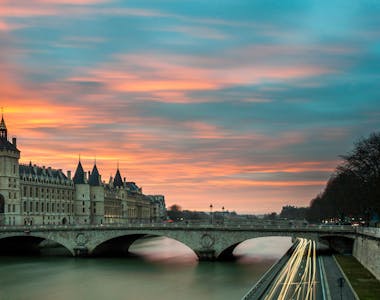
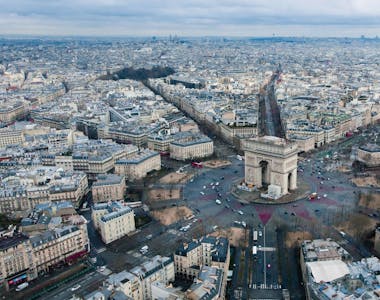
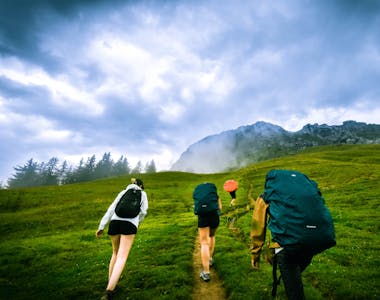
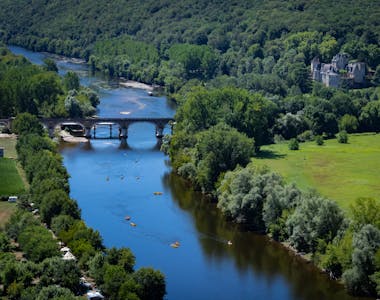
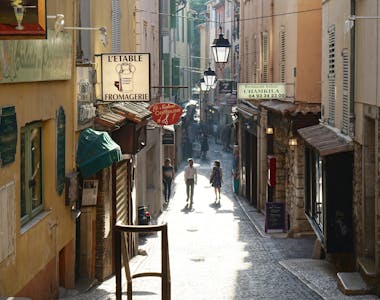
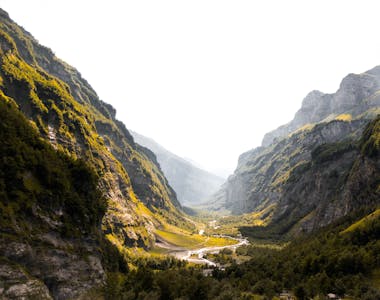
Book With Confidence
Monthly Payments
Spread the costs with no interest or additional fees
Best Price Guarantee
We won't be beaten on price. If you find this adventure at a lower price please get in touch!
Reserve now & pay later
Reserve your adventure today and pay later, free of charge
ATOL protected
Book with confidence
Hold your space today, for free
or book your trip with a deposit and then pay the rest in instalments.
Reserve your flights with us
Add flights to your booking and we'll take care of the rest. You'll get 24/7 support from our team & ATOL protection.
Speak to our experts
Call or email our expert team to find out more and help with ideas and planning.







